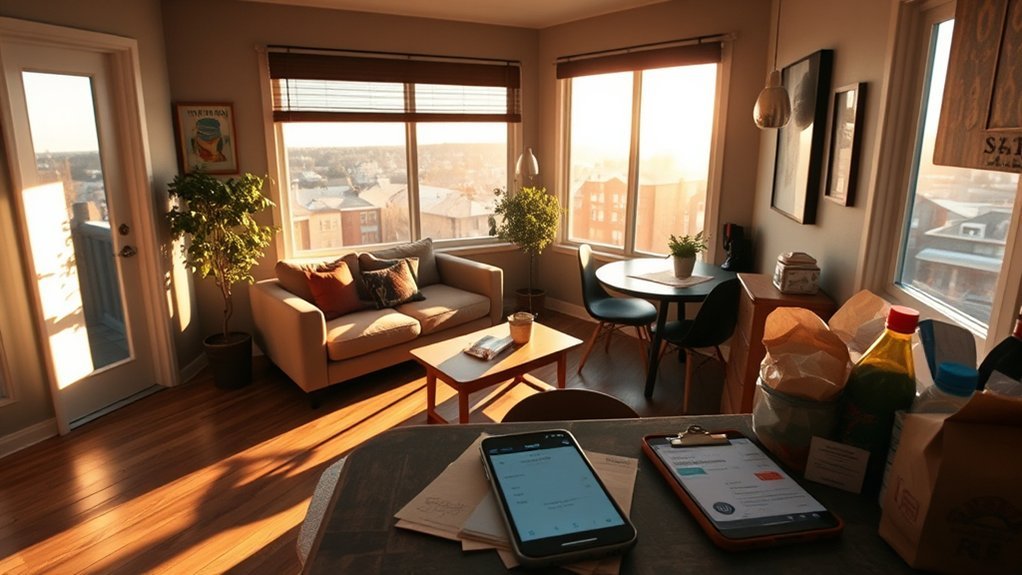You’ll find Richmond about 5.6% cheaper than the U.S. average, so a single adult’s comfortable salary is near $55,000 a year. Expect typical rent and essentials from roughly $1,400–$2,000 monthly depending on neighborhood; housing is the biggest variable, with median home prices around $367k–$419k and rents averaging $1,400–$1,600. Utilities, groceries, transit, and healthcare are near or slightly below national norms, and the sections below explain the specific line-item costs.
Cost of Living Overview for Richmond, VA

Because Richmond’s overall cost of living sits about 5.6% below the U.S. average (index ~95.8), you’ll generally pay less here than in many American cities. That lower cost of living shows in both Rent in Richmond and ownership figures: average monthly rent runs roughly $1,413–$1,573 (about 13.3% below the national $1,629), while home prices and ownership costs are also under national norms, with average listings near $421,461 and median estimates around $367,000–$419,000.
You should expect housing to be the largest variable in your budget. Suggested comfortable annual pay for a single adult is about $54,936, with yearly housing costs near $23,724. Typical renter household basics total roughly $4,578 monthly (housing ~$1,977; groceries ~$688; utilities ~$363; transportation ~$374). Additionally, understanding local market conditions can help in making informed choices regarding housing costs.
Homeowner basic expenses are higher overall but still below many metros, with estimated basic monthly costs around $7,874. Use these benchmarks to compare neighborhoods and plan realistic savings or mortgage scenarios.
Monthly Budget Breakdown for a Single Adult

To plan your monthly budget in Richmond, start with essential expenses like housing, groceries, utilities, transportation, and goods/services.
Expect housing to be the largest line item — roughly $1,977/month in a comfortable budget (citywide rents average about $1,413–$1,573), with groceries around $688/month.
Add utilities (~$360–$370/month) and transportation (~$374/month) to reach an estimated renter total near $4,578/month. Additionally, understanding the cost considerations of operating a group home can provide insights into potential expenses if you’re considering such a venture.
Essential Monthly Expenses
Housing will be your biggest monthly expense as a renter in Richmond — plan on about $1,413–$1,573 for rent and expect a total basic budget near $4,578/month, roughly 3.9% below the U.S. average.
For essentials, use data to allocate funds: the average rent in Richmond is the primary slice, but average monthly groceries are about $688, close to national levels.
Utilities (energy, phone, internet) average roughly $363 — energy ≈$198 and phone ≈$188.
Transportation and healthcare vary: budget $374 for transport and expect healthcare costs to be below national averages (doctor visit ≈$119), so add $500–$900 depending on driving and insurance.
Track specifics to adjust your living expenses precisely.
Housing and Rent
Plan your rent around the citywide average of $1,413–$1,573 per month, keeping in mind neighborhood variation from about $847 in lower‑cost areas to roughly $1,182 for inner‑city studios and $2,060 for three‑bedroom units in the center.
For a single adult, projected yearly housing expenses (~$23,724) imply about $1,977/month if you factor recommended affordability targets, so compare that to the city’s rent averages.
Homeowner basic housing costs average $1,873/month, and median listing prices near $419k sit about 18.8% below national levels.
Richmond rent is roughly 13% lower than the U.S. average, so you’ll often get more space for your dollar.
Use these data to set a realistic housing line in your monthly budget.
Transportation & Utilities
While Richmond’s transport and utility costs stay a bit below national averages, you’ll still want to budget precisely: expect basic utilities (energy, water, garbage, telecom) to run roughly $155–$213 monthly—with energy around $198 and phone service near $188 depending on your plan—and plan transportation costs between about $374 and $787 per month based on whether you drive or use public transit.
You’ll find choices that shift your monthly totals quickly. Consider these typical items:
- Driving: gas ~$3.17–$3.24/gal, commuting ~21 min each way, add maintenance (tire balance ~$56).
- Public transit: GRTC one-way $1.50, day $3.50, 30-day $60.
- Utilities: expect variability by season and consumption.
- Overall: combined transportation and utilities sit ~3.7–4.2% below U.S. averages.
Rental Market: Average Rent and What to Expect

You’ll typically pay about $1,413–$1,573 monthly for rent in Richmond, roughly 13% below the U.S. average, with a median 862 sq ft apartment near $1,318.
Expect sharp neighborhood variation — some areas run as low as ~$847 while others average $1,860+ — and three‑bedrooms range from about $1,730 outside the center to $2,060 downtown.
Note that advertised rent may or may not include utilities, parking, or pet fees, so check listings closely to know what you’re actually paying for.
Average Monthly Rent
Expect Richmond rents to be generally lower than the national average: reports put typical monthly rents between about $1,413 and $1,573 (roughly 13% below the U.S. average of $1,629), with an 862 sq ft apartment averaging near $1,318 and studios ranging from around $969 outside the center to $1,182 in the inner city.
You’ll find the average rent in Richmond reflects size and location; an average apartment will cost different amounts per month depending on unit and area. Consider these quick takeaways to plan your budget:
- Studios: ~$969 outside center, ~$1,182 inner city.
- 862 sq ft average apartment: ~$1,318 per month.
- 3-bed: ~$1,730–$2,060 depending on location.
- Overall rents sit ~13% below U.S. average.
Rent by Neighborhood
Now that you’ve seen overall rent figures for Richmond, it helps to look at how costs shift by neighborhood so you can target areas that fit your budget and lifestyle. You’ll find clear tiers: lower-cost neighborhoods (Austin Park, Brookland Park, Chatham Place) average near $847, mid-range areas (Woodland Heights, Monroe Ward, Museum District) run $1,124–$1,184, and higher-rent pockets (Brittons Hill, Dabney Center) push toward $1,863. Studios and three-bedrooms differ substantially by location. Expect city-center studios around $1,182 and three-bedrooms about $2,060; outside-city studios drop to ~$969 and three-bedrooms to ~$1,730. With renters at ~55% of households, demand near universities and downtown tightens inventory and raises competition.
| Neighborhood Tier | Typical Unit | Average Rent |
|---|---|---|
| Lower-cost | 1 BR | $847 |
| Mid-range | Studio/1 BR | $1,150 |
| High-cost | 2–3 BR | $1,863 |
| City center | 3 BR | $2,060 |
What Rent Covers
When you budget for rent in Richmond, plan on the monthly price covering just the unit itself—average advertised rents sit around $1,413–$1,573, about 13% below the national average of $1,629—so you’ll need to add utilities and other fees to get a true cost picture.
You’ll pay separately for basics often excluded from rent, and neighborhood or unit size changes totals materially. Expect studio vs three-bedroom differences and lower-cost pockets like Austin Park.
- Utilities: energy ~$197–$200 and internet ~$65 are common monthly adds.
- Phone: plan for about $188 if not bundled.
- Fees: parking and renter’s insurance vary by building.
- Budget impact: typical renter household expenses (excl. rent) average ~$4,578/month.
Homebuying and Typical Mortgage Costs

Although homes in Richmond generally cost less than in many U.S. metros, you’ll still want to budget carefully for purchase and ongoing payments: the average listing sits around $421,000 (median estimates ~$367k–$419k), and at a typical 30‑year mortgage rate near 6.80% a $418,775 loan produces roughly $2,700–$2,800/month in principal and interest before taxes and insurance.
Richmond homes are cheaper than many metros, but expect around $2,700–$2,800/month in mortgage payments before taxes and insurance.
When planning, use the median home price range to sanity‑check affordability and estimate monthly mortgage payments for different loan sizes. Add property taxes — roughly $1.20 per $100 of assessed value (about $3,480/year on a $290,000 home) — plus homeowners insurance and HOA fees where applicable.
Richmond’s housing costs are about 14–20% below national norms, which lowers ownership burdens, but remember utilities and maintenance. Typical owner household expenses average near $7,874/month in one scenario, with housing a major share.
Factor in down payment, closing costs, and an emergency maintenance fund to keep payments sustainable. Additionally, consider budgeting for unexpected legal expenses that may arise during homebuying or estate planning.
Groceries and Food Prices in Richmond

You’ll find groceries in Richmond slightly cheaper than the U.S. average, which helps stretch your food budget: overall grocery prices run about 0.5–5% below national norms (and roughly 8% below the Virginia average in some reports).
You’ll see everyday items at affordable cost: a loaf of bread ~ $4.00, a gallon of milk ~ $4.65, and a dozen eggs about $3.38–$4.22. Meat prices show steak near $15.50/lb and ground beef around $6.89–$6.99/lb.
- Expect the average price for a typical monthly grocery spend: renters about $688/month.
- Homeowners’ grocery estimates rise to roughly $1,367/month in local indexes.
- Per-person monthly food cost is about $350, reflected in the city’s cost-of-living weighting.
- Overall, groceries in Richmond contribute to the city being roughly 4–5% more affordable than the U.S. average.
This data-driven snapshot helps you plan a realistic food budget. Additionally, related costs such as air conditioning hose replacement can also impact your overall monthly expenses.
Utilities and Monthly Household Bills

Groceries may be a bit cheaper in Richmond, but your monthly household bills are another key part of the budget to take into account. Expect energy costs around $197.85/month and phone service near $187.77/month in typical breakdowns, which together drive overall utilities to roughly $385–$400 monthly.
A common utility package (energy, water, trash, sewer, internet/phone) typically runs $155.62–$213.29 for energy plus about $64.82 for a 60 Mbps internet plan, so your final total depends on home size and usage. Water and sewer vary by meter—example wastewater fees are $18.92 for a 5/8″ meter and $27.02 for a 3/4″ meter—while stormwater can add about $2.43/month for small single‑family homes.
Utility costs in Richmond sit about 3.7–3.8% below the U.S. average, with energy roughly 4% lower. If you own, factor in homeowner-specific charges like a natural gas flat fee (~$14.25) alongside typical monthly utilities when calculating housing costs. Additionally, regular maintenance can help prevent exhaust leaks which can lead to costly repairs.
Healthcare, Insurance, and Medical Costs

Health expenses in Richmond are generally lower than in many parts of the U.S., which helps keep your monthly medical and insurance costs down.
You’ll find overall healthcare spending per household is below national averages (about $5,639 vs. $6,159), and routine visits tend to be cheaper, so budgeting gets easier.
- Doctor visits typically run around $119–$120, roughly 18% below national averages, lowering out‑of‑pocket burdens and insurance copays.
- Dental appointments average $104–$107, and optometry checks are about $131–$133, keeping routine preventive care affordable.
- Common over‑the‑counter meds like ibuprofen cost about $11.21, so minor treatment expenses stay modest.
- For families, factor medical costs into broader budgets—EPI estimates include healthcare in a family‑of‑four monthly need, influencing childcare and household planning.
- Additionally, schools may face computer repair costs that can impact their overall budgeting for resources and technology.
Use these benchmarks to estimate monthly medical costs and insurance premiums, prioritize preventive care, and adjust savings targets for predictable healthcare spending.
Transportation, Commuting, and Vehicle Expenses

Get a clear picture of commuting and vehicle costs in Richmond so you can budget accurately: average monthly transportation expenses run about $787 for homeowners and $374 for renters, roughly 4.2% below the U.S. average, with annual household transportation around $12,247 versus $13,174 nationally.
You’ll find gasoline prices near $3.17–$3.24 per gallon, about 2% below the national rate, and basic services like tire balancing cost roughly $56–$57, near 9% below U.S. averages.
Your commute averages about 21 minutes, helped by Richmond’s spot at I‑95 and I‑64 and its proximity to Washington, D.C. and Virginia Beach.
If you drive, budget for fuel, maintenance, insurance, parking and occasional regional Amtrak trips starting around $16 one-way. Regular inspections of your vehicle can help prevent costly repairs down the line.
If you prefer transit, GRTC fares run $1.50 one-way, $3.50 day or about $60 monthly.
Use these figures to compare car ownership versus public transportation for your monthly plan.
Goods, Services, Entertainment, and Personal Care

While Richmond’s overall goods and services costs sit effectively level with the national average (about 0.2% lower), you’ll find several everyday expenses that tilt cheaper — think men’s dress shirts near $20.26.
You can budget confidently using the local cost of living index: goods & services are predictable, with dry cleaning about $15.46 and movie tickets around $13.02.
Personal care follows suit—haircuts average $26.91, beauty salon visits $48.38, and gym memberships $33.25 monthly.
Repair services vary but stay modest: washer repair ~$116.52 and tire balancing ~$56.23.
- Clothing bargains reduce outfit costs (women’s slacks ~$15.85, boy’s jeans ~$18.90).
- Entertainment is affordable (cinema $12–13, active arts scene like First Friday).
- Routine services (dry cleaning, basic repairs) align with the national mean.
- Personal care options let you choose budget or mid-range providers without large price jumps. Additionally, budgeting for unexpected expenses such as medical or home repairs can help maintain financial stability.
Frequently Asked Questions
How Does Richmond’s Cost of Living Compare to Nearby Cities Like Charlottesville?
Richmond’s cost of living is generally lower than Charlottesville’s; you’ll face shorter commute times, broader job markets, and more diverse cultural amenities, so you’ll often get better housing value while accepting slightly higher urban expenses.
Are There Seasonal Rent Fluctuations I Should Expect in Richmond?
Like clockwork, yes — you’ll see seasonal rent fluctuations tied to seasonal demand, lease renewals, and university cycles. Data shows summer peaks with higher rents; fall/winter generally drop, so plan timing and negotiate accordingly.
What Neighborhoods Are Safest yet Affordable for Young Professionals?
You’ll find Church Hill, The Fan, and Scott’s Addition safest yet affordable for young professionals: Fan-friendly vibes, transit-accessible routes, and nightlife-adjacent spots; crime rates moderate, rents reasonable, and amenities/data support commuter-friendly living.
How Much Do Pet-Related Expenses Add to a Monthly Budget?
Like a steady river adding flow, pet costs typically add $75–$200 monthly to your budget; factor in pet insurance, grooming costs, and occasional boarding fees, and you’ll plan realistically using clear, data-driven estimates.
Are Short-Term Furnished Rentals Significantly More Expensive Than Long-Term Leases?
Yes — you’ll usually pay a short term premium: furnished units include utilities and higher turnover fees, so monthly rates can be particularly above long-term leases; quantify locally, but expect 10–40% higher on average.
Conclusion
You’ll find Richmond’s costs line up like train cars—rent, groceries, utilities, transport—each linked to your monthly budget. If rent’s the engine, groceries and bills are the cars you can trim to save $200–$400. Commuting or buying a home shifts the whole train’s weight: expect higher mortgage payments but equity gains. Use local averages to plan, adjust discretionary spending, and you’ll keep your budget on schedule without unexpected derailments.


